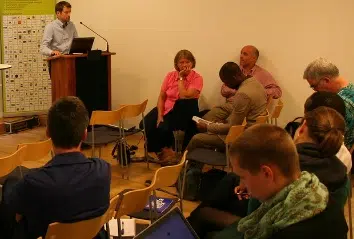 To understand what dialogic learning is, we must pay attention to the two words that make up the expression. The process that develops when acquiring knowledge is called learning .
To understand what dialogic learning is, we must pay attention to the two words that make up the expression. The process that develops when acquiring knowledge is called learning .
Dialogical , meanwhile, is that linked to dialogue : that is, to talk or conversation. The term dialogic is usually used to describe what offers the possibility of starting a discussion or debate.
With these ideas clear, we can advance the concept of dialogic learning. This is the name given to the training brought about by the interaction between different people who present their arguments regarding a certain issue. This type of learning usually occurs frequently in the educational field, although it can also occur in other contexts.
For dialogic learning to be possible, dialogue must develop freely . Participants must be able to present their reasons and defend them. In this framework, the position of those who hold a hierarchical position should not be of more value, but rather the arguments that are imposed due to their validity must prevail.
In dialogic learning, individuals learn from the exchange that takes place. This exchange can be generated between teachers and students in a class, but also between the students themselves. Even dialogic learning can arise between friends, within the family or with neighbors , without an institutional framework.
Dialogical learning is also associated with solidarity and the construction of meaning . There is collaborative work in which both differences and coincidences are valued, taking both as compatible.
Let's look at these and other fundamental points of dialogic learning below. Let's start with egalitarian dialogue , a tool that relies on the power of the arguments rather than the position within the social hierarchy of whoever issues them. As mentioned above, the role played by the sender, his age or his social class should not be taken into account in providing him with the opportunity to express himself.
 The concept of dialogic learning is supported by the work of two important thinkers: Habermas and Freire . The first argues that dialogue is needed to build knowledge . It suggests that we adopt a critical perspective that revolves around contemplating the thoughts of each member of the situation instead of focusing on just one. Habermas, for his part, points out that all individuals are capable of using oral and physical language to begin an interpersonal relationship.
The concept of dialogic learning is supported by the work of two important thinkers: Habermas and Freire . The first argues that dialogue is needed to build knowledge . It suggests that we adopt a critical perspective that revolves around contemplating the thoughts of each member of the situation instead of focusing on just one. Habermas, for his part, points out that all individuals are capable of using oral and physical language to begin an interpersonal relationship.
This brings us to another of the pillars of dialogic learning, cultural intelligence . All human beings can act and reflect. Our intelligence is inextricably linked to our culture, and includes communicative, practical and academic knowledge. In an educational environment, everyone should find the way and the resources to express said intelligence on equal terms .
Nor should we ignore the transformative power of education: it is not simply about providing students with new technical knowledge but about transforming their lives, about allowing them to change their environment and forge their own path. We are not aware of the harms of inequality until we know equality, which is a victory at a social level and allows us to explore our full potential .
In general, archaic educational systems generate a lack of interest in students, because they do not give them valid reasons to attend class but rather present themselves as an imposition. In traditional school, the teacher has the power and the student must follow all his instructions, regardless of whether he shares or understands them. The key to change is to include the student in the process, to respect their own history and guide them to find meaning in learning .
